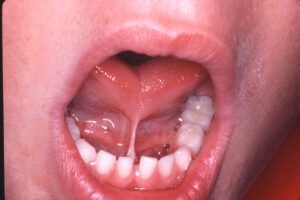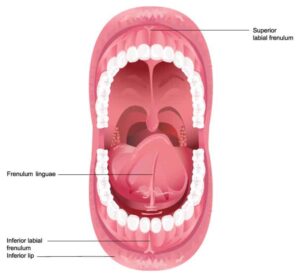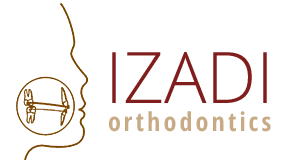An Overview

An example of tongue-tie in a young patient.
Tongue tie (ankyloglossia) is a condition that children are born with where the frenulum is too tight, causing a restriction in the movement of the tongue or lips. Tongue tie is easily treated with the use of dental laser technology. The condition is one of the dental problems we treat at Izadi Orthodontics in Timonium, MD.
What is a Frenulum?
 A frenulum (lingual frenulum) is a piece of soft tissue that connects the tongue to the base of the mouth. The lower and upper lips also have a frenulum that keeps the lips attached to their respective jaw.
A frenulum (lingual frenulum) is a piece of soft tissue that connects the tongue to the base of the mouth. The lower and upper lips also have a frenulum that keeps the lips attached to their respective jaw.
What is Tongue Tie?
When a baby is tongue-tied, the frenulum is unusually tight, thick, or short. When this thick band of tissues tethers the tongue unusually close to the floor of the mouth, it can lead to many issues with eating, swallowing, and speech. Sometimes there may be no obvious signs that a baby’s tongue is tied. Usually, the baby will show at least one of the symptoms of tongue tie, which include:
- Difficulty moving tongue (to the sides or up and down)
- Unable to stick out tongue past bottom teeth
- If the tongue appears heart-shaped or notched when stuck out
- Issues with breastfeeding
Many children grow up being tongue-tied and have no ill effects from it. For older children, signs they might be tongue-tied include if they complain that they are having issues eating, speaking, or reaching their back teeth with their tongue. Also, their dentist or school speech pathologist may notice the issues with the frenulum and recommend the parents seek treatment.
Risk Factors and Complications
No one is really sure what causes tongue tie although it sometimes runs in families. It is most often seen in boys than in girls. No matter what the cause is, it is important to treat it. This condition has been known to cause many issues as a child grows. From the beginning, a baby that is tongue tied will have issues latching on and breastfeeding.
This can cause problems with the baby gaining weight and getting enough nutrition. As a child gets older, they may have issues making certain letter sounds that will affect their speech. Poor speech development will lead to years of therapy to correct the issues with articulation. Another obvious sign for children is poor oral hygiene. They may simply not be able to properly clean their teeth
Tongue Tie Treatment
Izadi Orthodontics offers laser therapy frenectomy as a minimally invasive, permanent treatment option for releasing the frenulum restoring natural movement of the lips and tongue. A laser frenectomy is a safe and effective treatment for tongue tie.
What is a Frenectomy?
A frenectomy is a procedure used to release the frenulum in patients with tongue-tie. Once a surgical procedure, Izadi Orthodontics now uses innovative laser technology to reduce discomfort and swelling. A laser frenectomy is a brief treatment that can be completed from the comfort of our Timonium orthodontist office.
Tongue Tie FAQs
What is ankyloglossia?
Ankyloglossia is the clinical term for a condition that causes the tongue or lip frenulum to over-attach the tongue or lips to the base of the mouth to restrict natural movement. This condition is more commonly referred to as tongue tie.
-
Can I treat tongue-tie as an adult?
Treating tongue-tie soon after birth is ideal to prevent complications with speech development. However, patients can have a frenectomy at any age to treat tongue tie. Adult patients benefit from an improved range of motion of their tongue or lips.
Is laser treatment for tongue-tie safe for my baby?
Yes. A laser frenectomy treatment is safe for babies and children. The state-of-the-art lasers eliminate the need for sutures and actually promote the body’s natural healing response. Babies who have difficulty breastfeeding may improve at breastfeeding over the course of several weeks after treatment.
Can tongue-tie release itself?
Tongue-tie may resolve itself in early childhood stages. The frenum may loosen by itself, allowing the tongue to untie and move freely, promoting speech and easier mouth movement. If the tongue tie does not release on its own, a surgical procedure called a frenectomy may be used to release it.
When is the best time for a tongue tie to be corrected?
The best time for tongue tie to be corrected is as soon as it is noticed. We recommend correcting tongue tie right away, as it is easiest to handle immediately.
What happens if you don’t fix tongue tie?
If you do not fix a tongue-tie it may cause a variety of issues including jaw dysfunction such as clicking or popping. It also may cause migraines, jaw pain, and speech impediments.
